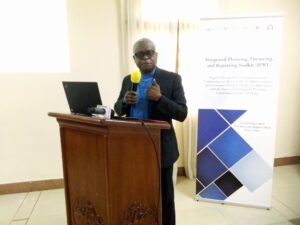Ghana urged to increase investment in data accessibility, availability on implementation of SDGs

Professor Bartholomew Armah, Chief, Development Planning Section, United Nations Economic Commission for Africa (ECA), has urged Ghana to increase investment in making data on the implementation of development goals more accessible and available.
That, he said, would enable development partners to effectively track progress made in the achievement of the targets that the country was signatory to and help address implementation challenges.
Prof Armah made the call in an interview with the media on the sideline of the opening of a three-day training workshop for selected Ministries, Department and Agencies (MDAs), in Accra.
The training, organised by the National Development Planning Commission (NDPC) and the ECA, was to equip selected MDAs with the knowledge on the “Applied Training on Integrated Planning and Reporting Toolkit (IPRT)” to enable them to effectively and efficiently prepare their reports.
The IPRT is a web-based planning tool that digitises national development plans (NDPs)to facilitate performance tracking of NDPs and their alignment to global and continental frameworks.
The tool helps countries to seamlessly align their national development plan to their international commitments, track performance on the national development priorities, and uses digital technology to help countries understand and align their financing frameworks, including their budgets, to their national development priorities.
It was developed by the ECA in response to the African Conference of Ministers of Finance and Planning meeting in 2016, which requested ECA and AUC to assist Member States in aligning/embedding the two Agendas in national planning frameworks to strengthen implementation and reporting.
Prof Armah noted that, as of October last year, Ghana had aligned about 74 per cent of the Sustainable Development Goals to its NDP, with about 70 per cent of Agenda 2063 targets were also aligned.
However, he said, alignment to the commitments was just the beginning of the implementation process, explaining that more work ought to be done to see results.
“So, even if you’re aligned at 70%, what have you achieved in terms of your own national development plan objectives? And what we are seeing is that there’s more need to really invest in data accessibility and availability,” he said.
“Sometimes, the data is there, but there’s no systems in place to make it easily accessible for reporting, and if you cannot report, you cannot really get a handle on where the challenges are,” he stressed.
Prof Armah also explained that, with planning process becoming more complex, and countries being asked to align their plans with multiple international commitments, such as Agenda 2063 and the 2030 Agenda for Sustainable Development, to ensure policy and planning coherence, it was imperative that an element of digitalisation was adopted to ease the reporting and alignment process.
He said the IPRT would, therefore, complement existing systems to ensure timely preparation of their reports.
“What I’m hearing is that there are tools out there. Some of the tools are still in the stages of being fully developed, but that aside, no one tool can do everything right effectively, so the key issue is how do we make these tools interoperable.
“So how do we make existing tools work with other tools so that you really get the best out of all the tools?” He asked.
Nana Opare-Djan, Director, Monitoring and Evaluation, NDPC, emphasised the importance of the IPRT in streamlining all development agendas to the country’s NDP.
He noted that, over the past years, MDAs had relied solely on labourious manual process in preparing sector plans, leading to delays and sometimes inaccuracies in those reports.
He said the training was, therefore, a step towards bridging the gap between manual and digital preparation of the reports, saying: “I believe the essence of this exercise is to ensure that we are able to mainstream all commitments that we are supposed to undertake for this country.”
“I believe the Integrated Plan, Financing and Reporting tool has come in handy and it will help and enable us do our work with some speed,” he added.
Source: GNA
